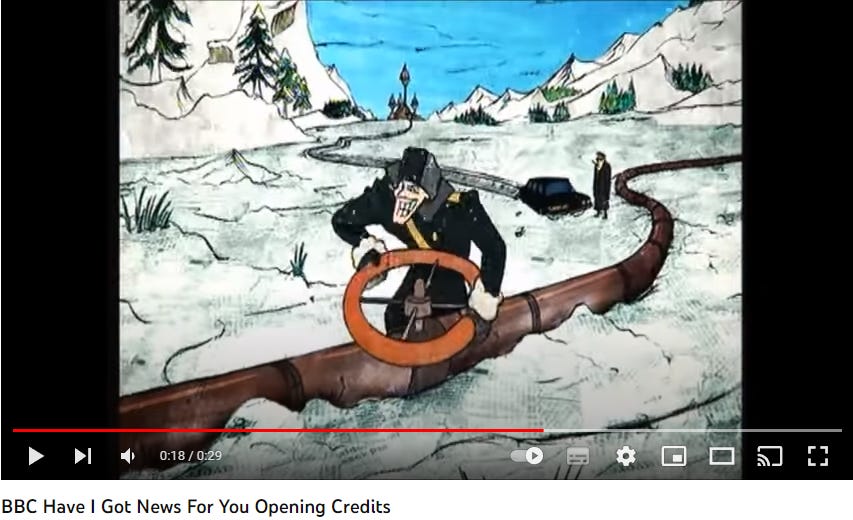The image above is from 2014, around the time of the Maidan revolution that overthrew the sitting government of Ukraine. A cackling Russian (they were evil when they were Communists and now because they’re not) is turning off the energy spigot.
Eight years later that section might have to be redrawn with a Baltic Sea background, though it’s still unclear whether the figures would have to be a Royal Navy submarine demolition team or USN sailors and USAF pilots, or both.
Left-wing (is ‘radical’ a better term?) comedian Jimmy Dore flays an article from the New York Times that tries to walk back prior US government statements of intent re Nordstream and to reconfigure what may count as an act of war, as a Great Puzzle:
As he points out, it is absurd to allege that Russia would bomb its own pipeline - and then commence repairing it - when it could indeed simply stop pumping, if it so wished.
In the truly bad old days when Stalin was on the throne, few in the free world (as we used to call ourselves) would do business with the Russian government. This presented an opportunity for the American industrialist Armand Hammer, who noted that the Russians would do exactly what they agreed to, which made it important to get all the contract details right; if you did, you could make money.
Russia is keenly aware of the West’s strategy of characterising it as a cartoon villain and this is why its leaders are at pains to construct public justifications for what they do, and to be seen to fulfil their agreements scrupulously.
So President Putin has dubbed his invasion of Ukraine a ‘special military operation’ to distinguish it from outright war. Last July, Russian Security Council Secretary Nikolai Patrushev listed the objectives in this way:
The goals of the special operations are to ensure the protection of people from genocide by the Ukrainian neo-Nazi regime, to demilitarize and seize the territory of Ukraine, in fact to achieve its neutral status as stipulated in the Ukrainian constitution.
Had Putin gone in WWII-style, targeting civilians as well as military, it would have been all over some time ago. His self-limited approach, which may have displeased some Moscow hawks and a portion of the Russian populace as well, has given third parties the chance to supply arms and training (and, it is suspected, boots on the ground) to President Zelensky’s regime.
This adds to the social and economic stresses in Russia, depletes her warfighting resources and might possibly result in regime change as Washington seems to desire. But there are two dangers in that change.
Firstly, we might be faced with an even harder-line leadership in Moscow. This brings to mind the situation in 1960, when Russian Premier Nikita Khrushchev was talking to the US and UK and it seemed relations between the Soviets and the West were beginning to thaw. In the midst of this the CIA insisted on one more nuclear-targeting flight over Russia; the US pilot Gary Powers was shot down and captured, and Khrushchev’s more hawkish rivals gained the ascendancy.
Secondly, the country that broke the back of Hitler’s army, not least by its reckless defence of Stalingrad, may be bloody-minded enough to go nuclear if it faces defeat in conventional military terms. Russia has a ‘no first use’ policy but Putin warned three weeks ago that a revision of that principle is possible:
Putin said that United States’ policy was not to exclude the possibility of “disarming” nuclear strike, while Russia’s doctrine is to use nuclear weapons as the last resort.
“So if we’re talking about this disarming strike, then maybe think about adopting the best practices of our American partners and their ideas for ensuring their security. We’re just thinking about it. No one was shy when they talked about it out loud in previous times and years.”
‘And yet he shakes his Sword before he strikes,’ as the Christmas song says.
One gets the feeling that some in Washington are lunatic gamblers, prepared to ignore the brandished sword. Either they think nuclear escalation could never happen, or that it would only devastate Ukraine and Western Europe, leaving the holy ground of the US unharmed; or that it doesn’t matter because the good guys are going to Heaven.
In the next twelve months, we may find out.





As the US continues to send stronger weapons to Ukraine, I don't think we have 12 months. Betting closer to three. That, plus Stoltenberg's suggestion of more "weapons of peace" in his speech, may send the sign to Russia that peace is not what NATO is looking for.